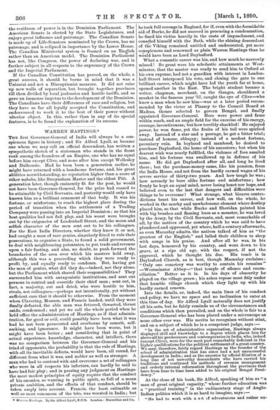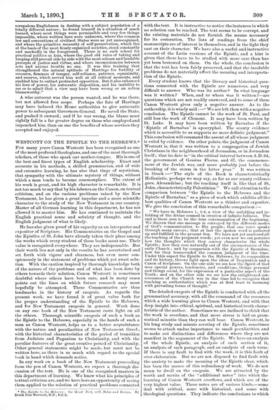WARREN HASTINGS.* THE first Governor-General of India will always be
a con- spicuous figure in history ; and Sir Alfred Lyall, as became one whom we may call an official descendant, has written a sympathetic sketch of a statesman who stands in the front rank among the founders of an Empire, one who has no equal before him except Clive, and none after him except Wellesley and Dalhousie. Had he been born a generation earlier, he might have returned with a handsome fortune, and, his great abilities notwithstanding, no reputation higher than a score of other nabobs, like Streynsham Master and the eldest Pitt. A generation later, though eminently fit for the post, he would not have been Governor-General, for the prize had ceased to be attainable by Civil Servants, and posterity would only have known him as a brilliant ornament of that body. It was his fortune, or misfortune, to reach the highest place during the period of transition when the settlements of a Trading Company were passing into an Imperial Dominion; so that his best qualities had not full play, and his worst were brought out by the exigencies of Leadenhall Street, and the mean and selfish character of the men sent out to be his colleagues. For the East India Directors, whether they knew it or not, bad caught a man of rare genius, singularly fitted to rule their possessions, to organise a State, to found a solid government, to deal with neighbouring potentates, to put trade and revenue upon a fair footing, and also, no doubt, to push forward the boundaries of the area over which his masters held sway, although this was a proceeding which they were ready to profit by, and equally ready to condemn. But, having got the man of genius, what did they do,—indeed, not they alone, but the Parliament which shared their responsibilities? They surrounded him with antagonistic institutions, and sent out persons to control and override their chief man ; sent out, in fact, a majority, cut and dried, who were hostile to him, rivals, not colleagues,—perhaps not intentionally, yet without sufficient care that it should be otherwise. From the moment when Clavering, Monson, and Francis landed, until they were finally defeated, the able man was fettered, thwarted, thrust aside, condemned ; and yet we call the whole period when he held office the administration of Hastings, as if that adminis- tration, for good or evil, could possibly have been what it was bad he not been persecuted and overborne by conceit, self- seeking, and ignorance. It might have been worse, but it might have been better ; and considering that in point of actual experience, knowledge, character, and intellect, there was no comparison between the Governor-General and his triad of opponents, the probability is that the rule of Hastings, with all its inevitable defects, would have been, all round, far different from what it was, and nobler as well as stronger. A man who had to contend with and overcome a set of colleagues who were in all respects his inferiors, can hardly be said to have had fair play; and in passing any judgment on Hastings, the most modest principles of equity require that the conduct of his enemies, so wanting in public spirit, so full of a mean private ambition, and the effects of that conduct, should be taken amply into account. Francis, the least estimable as well as most venomous of the trio, was worsted in India; but
Warren Habtings. By Sir Alfred Lyall, LOB. London : Macmillan and Co.
he took full revenge in England, for if, even with the formidable aid of Burke, he did not succeed in procuring a condemnation, he fined his victim heavily in the costa of impeachment, and consoled himself with the Bath, while the shining descendant of the Viking remained untitled and undecorated, yet more conspicuous and renowned as plain Warren Hastings than he would have been as Lord Daylesford.
What a romantic career was his, and how much he narrowly missed! So great were his scholastic attainments at West- minster, that the master was ready to send him to Oxford at his own expense, had not a guardian with interest in Leaden- hall Street interposed his veto, and closing the gate to one brilliant career, which might have led the youth far at home, opened another in the East. The bright student became a writer, chapman, merchant, on the Ganges, shouldered a•
musket in the famous year '57, caught the eye of Clive—who knew a man when he saw him—was at a later period recom- mended by the victor at Plessey to the Council Board at Madras, thence selected to govern Bengal, and finally appointed Governor-General Here were power and fame within reach, and an ample field for the exercise of his energy, courage, inventiveness; but how terribly shackled! He enjoyed power, he won fame, yet the fruits of his toil were spirited away. Instead of a star and a peerage, he got a bitter trial; instead of honour, obloquy; instead of a modest fortune, pecuniary ruin. In boyhood and manhood, he desired to purchase Daylesford, the home of his ancestors; but when his dearest wish was nearly fulfilled, the violence of foes assailed him, and his fortune was swallowed up in defence of his name. He did get Daylesford after all, and long he lived there; but the purchase-money came, like his pension, from the India House, and not from the hardly earned wages of his severe service of thirty-two years. And how tough he was ; how serenely he bore alike fortune and misfortune; how firmly he kept an equal mind, never losing heart nor hope, and believed even to the last that dangers and difficulties were things to be overcome ! What strange, what bizarre contra- dictions beset his career, and how well, on the whole, he worked in the murky and unwholesome element where destiny placed him, so that while Burke and Sheridan painted him with big brushes and flaming hues as a monster, he was loved by the Army, by the Civil Servants, and, most remarkable of all, by the natives of the country which he was said to have plundered and oppressed, yet where, half-a-century afterwards, as even Macaulay admits, the natives talked of him as "the greatest of the English," and lulled their children to sleep with songs in his praise. And after all he was, in his last days, honoured by his country, and went down to his grave, at a ripe old age, with the respect, if not the approval, which he thought his due. His tomb is in Daylesford Church, as is best, though Macaulay exclaims : "Only one cemetery was worthy to contain his remains" —Westminster Abbey—" that temple of silence and recon- ciliation." Better as it is. In his days of obscurity he played on the village green ; his ashes repose most fitly under that humble village church which they light up with his hardly earned renown.
Into the details, or, indeed, the main lines of his conduct and policy, we have no space and no inclination to enter at this time of day. Sir Alfred Lyall naturally does not justify all his acts, but he fairly reminds us of the circumstances and.
conditions which then prevailed, and on the whole is fair to a Governor-General who has been placed under a microscope as none other ever was. His merits he recognises without stint, and on a subject of which he is a competent judge, says :—
"In the art of administrative organisation, Hastings always displayed skill and knowledge to a degree which places him far above all his predecessors and contemporaries in India, who, indeed (except Clive), were for the most part remarkably deficient in the higher qualifications for the political settlement of a great country. We may, therefore, fairly regard Hastings as the founder of the school of administration that has since had a not unsuccessful development in India ; and as the ancestor by official filiation of a long line of not unworthy descendants who have carried his traditions and continued his methods of revenue management and orderly internal reformation throughout the provinces that have from time to time been added to his original Bengal Presi- dency."
At the close of his book, Sir Alfred, speaking of him as "a man of great original capacity," whose further education was a "practical training" in the rudimentary stage of Anglo- Indian politics which it is so hard to imagine, says
He had to work with a lint of adventurous and rather un-
scrupulous Englishmen in dealing with a subject population of a totally different nature ; he found himself in a situation of much hazard, where most things were permissible and very few things impossible, where written laws were unknown, where the common law and conventions of civilised States were as yet unrecognised, and where the primitive necessity of self-preservation, which lies at the basis of the most firmly organised societies, stood constantly and markedly in the foreground. There is no such school for practical politics as Asia, where the good old rules of taking and keeping still prevail side by side with the most solemn and laudable precepts of justice and virtue, and where inconsistencies between acts and axioms trouble no one. It was this training that strengthened the natural aptitude of Hastings for fertility of resource, firmness of temper, self-reliance, patience, equanimity, and reserve, which served him well at all critical moments, and enabled him to outlast protracted opposition. But it also enhanced his love of power, his autocratic disposition, and his inability to see or to admit that a view may have been wrong or an action blameworthy."
A wise autocrat was the person wanted, and he was there, but not allowed free scope. Perhaps the fate of Hastings may have induced the Home authorities to give autocratic power to subsequent Governors-General. He saved the State, and pushed it onward ; and if he was wrong, the blame must rightly fall in a far greater degree on those who employed and impeached him, than on one the benefits of whose services they accepted and enjoyed.







































 Previous page
Previous page